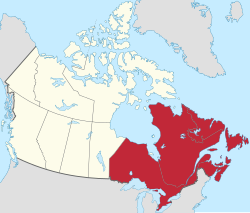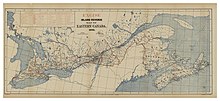Eastern Canada
Eastern Canada
Est du Canada (French) | |
|---|---|
Region | |
 Eastern Canada (red) within the rest of Canada (tan) | |
| Country | Canada |
| Composition |
|
| Principal cities | |
| Area | |
| • Total | 2,783,400 km2 (1,074,700 sq mi) |
| Population (2016) | |
| • Total | 23,946,177 |
| • Density | 8.6/km2 (22/sq mi) |
Eastern Canada (French: Est du Canada, also the Eastern provinces, Canadian East or the East) is generally considered to be the region of Canada south of Hudson Bay/Hudson Strait and east of Manitoba, consisting of the following provinces (from east to west): Newfoundland and Labrador, Nova Scotia, Prince Edward Island, New Brunswick, Quebec and Ontario.
Ontario and Quebec, Canada's two largest provinces, define Central Canada; while the other provinces constitute Atlantic Canada. New Brunswick, Nova Scotia and Prince Edward Island are also known as the Maritime provinces.[1]
Capitals
[edit]Ottawa, Canada's capital, is located in Eastern Canada, within the province of Ontario.
The capitals of the provinces are in the list below:
- Newfoundland and Labrador - St. John's
- Nova Scotia - Halifax
- Prince Edward Island - Charlottetown
- New Brunswick - Fredericton
- Quebec - Quebec City
- Ontario - Toronto
Definitions
[edit]
The Canadian Press defines Eastern Canada as everything east of and including Thunder Bay, Ontario.[2]
Population
[edit]The total population of this region is about 23,946,177 in 2016, or about 70% of Canada's population. Most of the population resides in Ontario and Quebec. The region contains three of Canada's five largest metropolitan areas, Toronto being the fourth largest municipality in North America.

Top left: The Quebec City–Windsor Corridor is the most densely inhabited and heavily industrialized region accounting for nearly 50 percent of the total population[3]
- Largest metropolitan areas
- Toronto, Ontario - 6,254,191
- Montreal, Quebec - 4,098,927
- National Capital Region (Ottawa-Gatineau, Ontario-Quebec) - 1,568,381
- Quebec City, Quebec - 807,200
- Hamilton, Ontario - 536 917
- London, Ontario - 474 786
- St. Catharines-Niagara, Ontario - 447,888
- Kitchener, Ontario - 441 380
- Halifax, Nova Scotia - 403,131
- Windsor, Ontario - 329,144
- Barrie, Ontario - 212,667
- Sherbrooke, Quebec - 212,105
- St. John's, Newfoundland and Labrador - 205,955
The population of each province in 2016, from greatest to least is here:
- Ontario - 13,448,494
- Quebec - 8,164,361
- Nova Scotia - 923,598
- New Brunswick - 747,101
- Newfoundland and Labrador - 519,716
- Prince Edward Island - 142,907
Politics
[edit]Eastern Canada is represented by 231 Members of Parliament out of the 338 (121 in Ontario, 78 in Quebec, and 32 in the Atlantic Provinces) and 78 senators out of 105.
| Party name | ON | QC | NB | NS | PE | NL | Total | ||
|---|---|---|---|---|---|---|---|---|---|
| Liberal | Seats: | 78 | 35 | 6 | 8 | 4 | 6 | 137 | |
| Vote: | 39.3 | 33.6 | 42.4 | 42.3 | 46.2 | 47.7 | – | ||
| Conservative | Seats: | 37 | 10 | 4 | 3 | – | 1 | 55 | |
| Vote: | 34.9 | 18.6 | 33.6 | 29.4 | 31.6 | 32.5 | – | ||
| New Democratic Party | Seats: | 5 | 1 | – | – | – | – | 6 | |
| Vote: | 17.8 | 9.8 | 11.9 | 22.1 | 9.2 | 17.4 | – | ||
| Bloc Québécois | Seats: | – | 32 | – | – | – | – | 32 | |
| Vote: | – | 32.1 | – | – | – | – | – | ||
| Green | Seats: | 1 | – | – | – | – | – | 1 | |
| Vote: | 2.2 | 1.5 | 5.2 | 1.9 | 9.6 | – | – | ||
| Total seats | 121 | 78 | 10 | 11 | 4 | 7 | 231 | ||
| 137 | 55 | 32 | 6 | 1 | |
| Liberal | Conservative | Bloc Québécois | N | G |
| 140 | 50 | 32 | 8 | 1 | |
| Liberal | Conservative | Bloc Québécois | ND | G |
| 152 | 45 | 24 | 10 | |
| Liberal | Conservative | NDP | BQ |
| 92 | 87 | 30 | 4 | |
| Conservative | New Democratic | Liberal | B |
| 71 | 69 | 49 | 22 | 2 | |
| Conservative | Liberal | Bloc Québécois | NDP | I |
| 87 | 59 | 51 | 15 | 1 | |
| Liberal | Conservative | Bloc Québécois | NDP | I |
| 118 | 54 | 31 | 10 | |
| Liberal | Bloc Québécois | Conservative | NDP |
| 155 | 38 | 10 | 5 | 2 | |
| Liberal | Bloc Québécois | PC | N | C |
| 138 | 44 | 19 | 8 | 1 | |
| Liberal | Bloc Québécois | PC | ND | I |
| 148 | 54 | 2 | 1 | 1 | |
| Liberal | Bloc Québécois | P | R | I |
| 121 | 75 | 10 | |
| Progressive Conservative | Liberal | NDP |
| 150 | 38 | 13 | 1 | |
| Progressive Conservative | Liberal | NDP | I |
| 145 | 52 | 5 | |
| Liberal | Progressive Conservative | N |
See also
[edit]References
[edit]- ^ "Maritime Provinces". The Canadian Encyclopedia. Retrieved 8 November 2015.
- ^ Canadian Press Style Guide. Canadian Press. 1995. p.471
- ^ McMurry, Peter H.; Shepherd, Marjorie F.; Vickery, James S. (2004). Particulate Matter Science for Policy Makers: A NARSTO Assessment. Cambridge University Press. p. 391. ISBN 978-0-521-84287-7.
- ^ a b "Official Voting Results".
- ^ "Official Voting Results".
- ^ "Official Voting Results".
- ^ "OVR / ROS".
- ^ "OVR / ROS".
- ^ "OVR / ROS".
- ^ "OVR / ROS".
- ^ a b "Past elections – Elections Canada".
- ^ a b c d Parliament, Library of. "History of the Federal Electoral Ridings, 1867-2010 - Open Government Portal". open.canada.ca.
47°11′22.96″N 70°8′12.19″W / 47.1897111°N 70.1367194°W
External links
[edit] Media related to Eastern Canada at Wikimedia Commons
Media related to Eastern Canada at Wikimedia Commons The dictionary definition of Eastern Canada at Wiktionary
The dictionary definition of Eastern Canada at Wiktionary
